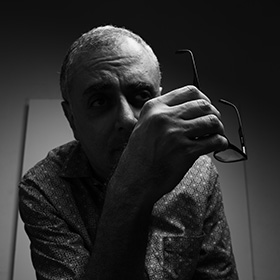TITLE AND LINKS -> |
Thinking a cultural policy in Lebanon in the spectrum of current cultural dynamics
Lecture by Ricardo Mbarkho
|
Artistic Practices independants from Art Market
Lecture by Ricardo Mbarkho via video
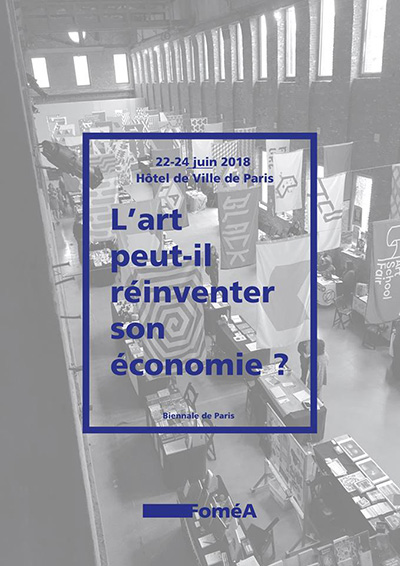
|
What is at Stake in the Interaction Between Media Arts and Cultural Industries
Lecture by Ricardo Mbarkho
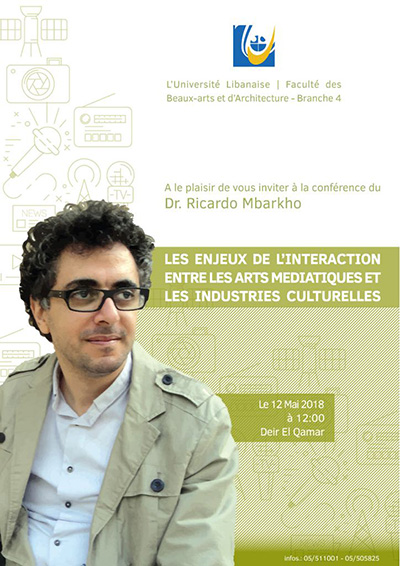
|
What is at Stake in the Interaction Between Media Arts and Cultural Industries
Lecture by Ricardo Mbarkho
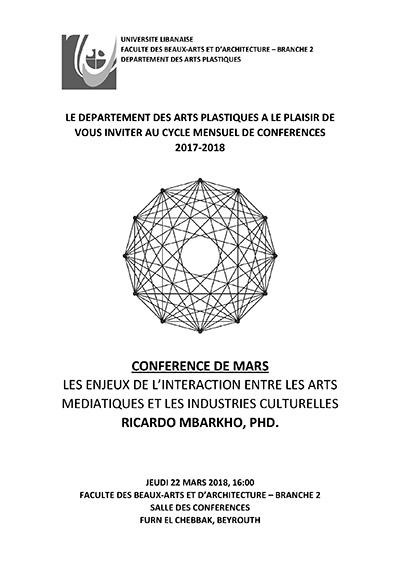
|
The Stakes of Visual Arts in Lebanon
Lecture by Ricardo Mbarkho
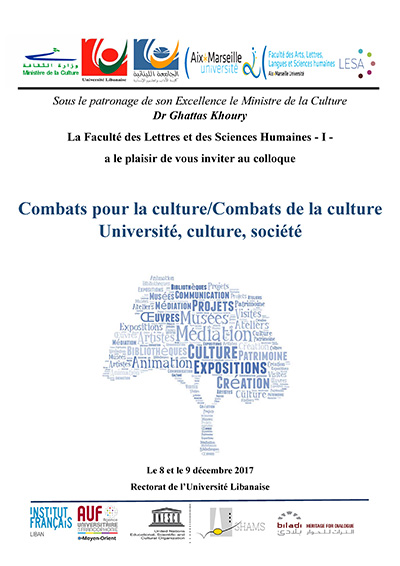
|
Intervention de Ricardo Mbarakho dans la Journée d’étude Arts et politique culturelle dans le sud
méditerranéen |
Travailler avec le monde arabo-musulman après les « Printemps arabes »
Modération : Claudine Dussollier, Transversité, Marseille
Compte-rendu : Danièle Yvergniaux, EESABretagne
Intervenant.es : François Lejault, ESA Aix en Provence
Hela Djobbi, ESABA TALM (Tours)
Ricardo Mbarkho, université ALBA, Beyrouth
Participant.es :
Julie Deutsch, ENSAD Nancy
Mathilde Sauzet Mattei, ESAA Annecy
Danièle Yvergniaux, EESAB, Bretagne
David Cascaro, HEAR, Strasbourg-Mulhouse
Claude Puig Legros, ESADMM, Marseille
David Mozziconacci, IsdaT, Toulouse
Illyess Chaddou, ESA Clermont-Ferrand
Sara-Lou Berthelot, Hear Strasbourg
Amel Nafti, illa Arson, Nice
Dalia Messara, ESA Aix
Manon Rivière, ESADHAR
Cédric Parizot, IREMAM – CNRS, Aix-Marseille Université
Yvan Freund, Hear Strasbourg
Vincent Bapst, HEAR Strasbourg
Marie-Cécile Floderer, HEAR Strasbourg
Marie-Haude Caraës, TALM, Tours |
Le modèle socio-économique de l'art «invisuel», un inter-modèle
Lecture by Ricardo Mbarkho
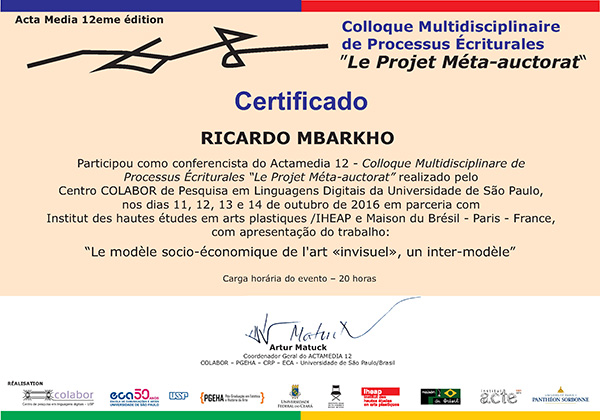
|
Cultural business incubators, incubators for Democracy?
Lecture by Ricardo Mbarkho
Link:
|
The use of social and political space as a medium for artistic practice (L’utilisation de l’espace social et politique comme support d’une pratique artistique)
Lecture by Ricardo Mbarkho |
The Lebanese National Tabbouleh Day
Lecture by Ricardo Mbarkho |
Digital Art: History and New Aesthetic (Enjeux de l'art numérique : Histoire et nouvelle esthétique)
Lecture by Ricardo Mbarkho
Link:
|
Strategies and Territories (Enjeux et territoires)
Round table with the Presidents of the Administration Boards of the Art Schools of Provence-Alpes-Côte-d'Azur and Monaco.
Discussion about the euro-mediterranean cooperation, in the presence of the Dean of the Fine Arts Faculty of Alexandria, and of Ricardo Mbarkho, Adjunct-Director of the Visual Arts School of the Lebanese Academy of Fine Arts, Beirut, Lebanon.
Lien :
|
The use of social and political space as a medium for practicing (L’utilisation de l’espace social et politique comme support d’une pratique)
Interview (Master Class) with Ricardo Mbarkho by Alexandre Gurita
Link:
|
Digital Art and Cinema
Lecture by Ricardo Mbarkho and Claire Duport
Link:
|
Artists and the digital revolution (Les artistes et la révolution numérique)
Round Table moderated by Claudine Dussolier
Link:
|
Professional Encounter at the MEDiaLab
Link:
|
Political Art, art and politic (Art politique, art et politique)
Seminar by Ricardo Mbarkho and Claire Duport
Link:
|
A view on the new forms of artistic expression by the young Arabs
Round Table co-moderated by Ricardo Mbarkho and Tereza Wagner (UNESCO) |
Conferences on the History and the Future of the Internet
Links:
|
A Panoramic Possible View - Relations between art and sciences in the Mediterranean region.
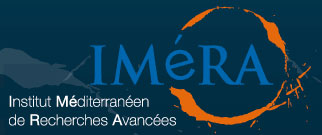
Links:
|
Arts and the Lebanese National Tabbouleh Day
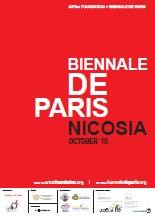
Links:
|
International Networking in the Creation Field
Links:
|
Enjeux de la création numérique
Lecture by Ricardo MBARKHO and Marika DERMINEUR
Links (French):
|
Beirut
and Media Art today
Link:
|
RAMI:
International Encounters on Arts and Multimedia
Link:
|
RAMI:
International Encounters on Arts and Multimedia
|
RAMI:
International Encounters on Arts and Multimedia
|
eCulture,
Creative Content and DigiArts |
Art
and New Media in Lebanon |
Creation
of Art, Design and Technology Master Classes
Link:
|
How
to make art with Internet |
Place
of the new technologies in the conception process of the art piece |
| CONTEXT -> |
Arab-German Young Researchers Exchange
'Cultural Policy and Cultural Mediation in Transforming Societies' October 18–24, 2018
Beirut, Lebanon |
FoméA
Forum
mondial
des économies de l’Art. Hôtel de Ville de Paris,
22-24 June 2018 |
Lebanese University
Deir el Kamar, Lebanon |
Lebanese University
Furn el Chebak, Lebanon |
Combats pour la culture/Combats de la culture - Université, culture, société
December 8 and 9, 2017
Rectorat of the Lebanese University |
Arts et politique culturelle dans le sud méditerranéen -
Consistance et consolidation d’une demande sociale
08 novembre 2017
ERAC, Friche de la Belle de Mai
Marseille - France |
Une nouvelle Europe pour un nouveau monde,
les écoles d'art dans la globalisation
Séminaire d’été de l’ANdEA
Association nationale des écoles supérieures d’art
7-8 septembre 2017
Strasbourg, France |
Colloque Acta Media 12 : Multidisciplinaire Méta-auctorat – Paris (France). |
Incubinc/AMI & Roberto Cimetta Fund. Joint Conference. Marseille (France). |
Institute des hautes études en arts plastiques (IHEAP) - Paris @ Jeu de Paume - Paris (France). |
Institute des hautes études en arts plastiques (IHEAP) - New York @ Ashok Jain Gallery - 58 Hester Street, New York, NY 10002 |
The international colloquium "Penser le numérique" (think the digital) - Beirut (Lebanon). @ Institut d’études scéniques, audiovisuelles et cinématographiques - Saint-Joseph University
|
Journée des écoles Supérieures d'Art de Provence-Alpes-Côte-d'Azur et Monaco @ Villa Méditerranée, Marseille (France) |
Session 2014-2016. « L’INVISUEL» @ The Institute des hautes études en arts plastiques (IHEAP) - Paris (France). |
RAMI 3.0 (International Encounters on Arts and Multimedia) – Beirut (Lebanon). @ Notre Dame University |
RAMI 3.0 (International Encounters on Arts and Multimedia) – Beirut (Lebanon).
@ SHAMS, Tayyouneh |
RAMI 3.0 (International Encounters on Arts and Multimedia) – Beirut (Lebanon).
@ AltCity, Hamra |
RAMI 3.0 (International Encounters on Arts and Multimedia) – Beirut (Lebanon).
@ the Académie Libanaise des Beaux-Arts - University of Balamand and at Saint Joseph University |
Ceremony of the 10th edition of the UNESCO-Sharjah Prize for the Arab culture. UNESCO - Paris |
WJ-SPOTS, in the frame of the festival Mal au Pixel. La Gaïté Lyrique - Paris |
Art and Sciences in the Mediterranean Rim. Which inter-cultural situation? IMéRA, Marseille - France |
ARTos Foundation + BIENNALE DE PARIS - Nicosia - Cyprus. |
CREA NUMERICA 09 - BEIRUT |
CREA NUMERICA 09 - BEIRUT |
European
Media Art Festival (EMAF), Osnabrueck, Germany. |
Alexandria,
Egypt.
In the frame of the 24th Biennale of Arts of Alexandria. |
Dawar
el Shams (The Sunflower), Beirut, Lebanon. |
Dawar
el Shams (The Sunflower), Beirut, Lebanon. |
World
Summit Contributory Conference on ICT & Creativity, Vienna,
Austria. |
Transmediale.05,
Berlin, Germany. |
ARS
Electronica, Linz, Austria. Workshop initiated by UNESCO. |
Superior
Institut of Fine Arts, Sousse, Tunisia. |
In the frame of the "Journées
Méditerranéennes des Arts Plastiques", 4th session.
Sousse, Tunisia. |
| INFO -> |
Ricardo Mbarkho presents in his lecture the conditions of a cultural policy in Lebanon that can operate between several conceptions of art on the current Lebanese art scene, ranging from an instituted and conservative art, which refers to tradition and embraces the forms and contents of his time, towards a contesting art that experiments with new forms and messages. The latter is an avant-garde, revolutionary art calling for novelty, in opposition to the first conception of art, specific to the artists integrated in the instituted art field.
|
Download the catalog in PDF [French] |
Digitization affects media arts and cultural industries equally. Based on this observation, we develop in the framework of our research the hypothesis according to which the relations between cultural industries and media arts practices are not reduced to a simple face-to-face.
How in this interaction between cultural industries and media arts, a specific area of intermediation can be put in place and what are the ways to achieve this? What are the impacts and issues of all kinds, when the intermediation structure intervenes between media arts and cultural industries, with regard to the media arts?
In our research, we propose to bring a new heuristic perspective on the parallel and sometimes combined mutations of media arts and cultural industries. In particular, we study to what extent and under what conditions the media arts can constitute from their meeting, possibly from their synergy with the cultural industries, the opportunity to play a leading role in the development of the creative industries.
|
Digitization affects media arts and cultural industries equally. Based on this observation, we develop in the framework of our research the hypothesis according to which the relations between cultural industries and media arts practices are not reduced to a simple face-to-face.
How in this interaction between cultural industries and media arts, a specific area of intermediation can be put in place and what are the ways to achieve this? What are the impacts and issues of all kinds, when the intermediation structure intervenes between media arts and cultural industries, with regard to the media arts?
In our research, we propose to bring a new heuristic perspective on the parallel and sometimes combined mutations of media arts and cultural industries. In particular, we study to what extent and under what conditions the media arts can constitute from their meeting, possibly from their synergy with the cultural industries, the opportunity to play a leading role in the development of the creative industries. |
Pour illustrer les enjeux actuels des arts visuels au Liban, Ricardo Mbarkho part d’un cas allégorique avec lequel il montre que les racines des regroupements artistiques au Liban aujourd’hui sont les conséquences d’évènements qui ont eu lieu pendant et après la guerre libanaise de 1975. Si ces évènements ont fait leur impact durable sur la scène artistique actuelle au Liban, la question qui se pose est celle de savoir comment dans un tel conflit artistique et culturel l’on peut définir le rôle d’une intermédiation creative et fertile entre un art progressiste et un art du marché, un art militant et un art conformiste. Comment les agents des arts visuels peuvent collaborer avec les acteurs des industries culturelles dans un projet de production creative ? |
Je présente dans cette intervention les conditions d’une politique culturelle pouvant opérer entre plusieurs conceptions de l’art sur la scène libanaise actuelle, allant d’un art institué et conservateur, qui renvoie à la tradition et épouse les formes et les contenus de son époque, vers un art contestataire qui expérimente des formes et des messages nouveaux. Ce dernier est un art progressiste et révolutionnaire convoquant la nouveauté, en opposition à la première conception de l’art, propre aux artistes intégrés au milieu de l’art institué.
Partant du constat de ces deux conceptions de l’art, on peut se demander où peut se situer une politique culturelle libanaise qui reposerait sur l’égalité des chances entre les agents de l’art résistant et les acteurs de l’art conservateur. Comment dans cette interaction entre industries culturelles et arts visuels, une zone spécifique d’intermédiation peut-elle se mettre en place et quels en sont les moyens pour y parvenir ? Est-ce que la politique culturelle est justement la dynamisation de cette zone intermédiaire ? Quelles sont les incidences et les enjeux de toute nature lorsque la structure d’intermédiation s’interpose entre arts visuels et industries culturelles, au regard de la politique culturelle ?
Dans notre recherche, nous nous proposons d’apporter un nouvel éclairage heuristique sur les mutations parallèles et parfois conjuguées des arts visuels et des industries culturelles au sein d’une politique culturelle dynamisante. Nous étudions notamment dans quelle mesure et à quelles conditions les arts visuels peuvent tirer de leur rencontre, éventuellement de leur synergie avec les industries culturelles, l'occasion de jouer un rôle de premier plan dans le développement de la politique créative, voire des industries créatives.
Mots clefs : Politique culturelle, arts visuels, industries culturelles, industries créatives, intermédiation |
Au Liban, dans l’enseignement supérieur, il y a un réseau privé aussi actif et reconnu que le réseau public, les échanges internationaux peuvent se faire avec aussi bien avec écoles privées. Cela peut être plus facile avec des écoles privées, qui ont plus de moyens, avec lesquelles les démarches vont plus vite. Les projets pédagogiques dans les écoles privées sont assez sélectifs, tandis que les universités publiques ont un fonctionnement plus démocratique.
La géographie libanaise est une géographie laboratoire, très mélangée, avec la juxtaposition et l’imbrication de multiples religions, positions politiques, ethnies.., qui produisent une multiplicité d’approches, y compris artistiques, très passionnantes pour des Européens, et des étudiants français en particulier.
Les étudiants français en échange se retrouvent confrontés à des cultures très proches et très lointaines en même temps, et les Libanais ne connaissent pas forcément mieux la situation du pays, et sa complexité. La scène artistique reflète cette complexité et ce multiculturalisme. Il y a une présence forte de français au Liban.
Il n’y a pas eu de printemps arabe au Liban, il n’y a pas de dictateur, et il n’y a pas besoin de visa pour aller au Liban. La situation est très différente des autres pays du bassin méditerranéen musulman. L’histoire du Liban est surtout très fortement marquée par les guerres passées et aujourd’hui, le pays s’inscrit dans une volonté et un processus de paix.
Il est assez simple d’engager des partenariats entre une école d’art publique française et une école d’art et/ou une université privée ou publique au Liban. Une convention doit être établie à parti d’un protocole d’échanges, cette convention permet de rechercher et de mobiliser des financements, notamment celui de l’institut français qui peut financer les séjours d’enseignants français par une subvention attribuée à l’école libanaise, si l’IF est également signataire de la convention. |
|
|
Art process:
My artistic practice is fully integrated in its social context because it is the reflection of a war-ridden country called Lebanon. The war in Lebanon has taken its toll on our lifestyle, therefore, I wanted to raise awareness to the importance of life manifested and focused years ago through my project: The Lebanese National Tabbouleh Day. It is a Holiday that I have created to gather all the Lebanese people (and friends) around a traditional dish, which is: Tabbouleh; in order to show and strengthen our attachment to life. It is an opportunity for all of us, citizens of the world. This day comes yearly, on the 1st Saturday of July. How do we celebrate this day? The idea is not necessarily to be around the biggest dish of Tabbouleh and eat it, but to be together at this specific day at the same time anywhere on earth (in Lebanon or abroad) to celebrate life. We encourage all the Lebanese (and friends) to consider the 1st day of July a holiday where all family and friends meet to honor our survival which became a valuable quality through many years of struggling. Keep in mind that the purpose of this event is to raise awareness around the value of life as is, regardless of our origins, family, personal or social conditions.
Ricardo Mbarkho |
Art process:
My artistic practice is fully integrated in its social context because it is the reflection of a war-ridden country called Lebanon. The war in Lebanon has taken its toll on our lifestyle, therefore, I wanted to raise awareness to the importance of life manifested and focused years ago through my project: The Lebanese National Tabbouleh Day. It is a Holiday that I have created to gather all the Lebanese people (and friends) around a traditional dish, which is: Tabbouleh; in order to show and strengthen our attachment to life. It is an opportunity for all of us, citizens of the world. This day comes yearly, on the 1st Saturday of July. How do we celebrate this day? The idea is not necessarily to be around the biggest dish of Tabbouleh and eat it, but to be together at this specific day at the same time anywhere on earth (in Lebanon or abroad) to celebrate life. We encourage all the Lebanese (and friends) to consider the 1st day of July a holiday where all family and friends meet to honor our survival which became a valuable quality through many years of struggling. Keep in mind that the purpose of this event is to raise awareness around the value of life as is, regardless of our origins, family, personal or social conditions.
Ricardo Mbarkho |
[French]
Avec cette conférence, Ricardo Mbarkho, artiste d’art numérique engagé, recense les enjeux de l’art numérique tout en retraçant les étapes de l’histoire de l’art qui ont préparé le terrain théorique aux artistes avant l’air de la numérisation depuis les débuts des années 1990. Ricardo Mbarkho explique l’impact des Nouvelles Technologies de l'Information et de la Communication sur l’art actuel, et pense les nouvelles esthétiques nées de cette nouvelle vision du monde de l’art ; monde virtuel où artistes, développeurs informatiques, ingénieurs électroniques et scientifiques collaborent ensemble, aboutissant à des œuvres participatives, collaboratives, en ligne, ici et à distance, virtuelles et réelles à la fois. Le but est d’avoir un aperçu sur l'histoire des nouveaux médias et l’art, pour analyser des travaux artistiques et comprendre les critères du jugement pour cette nouvelle esthétique. |
|
Art process:
My artistic practice is fully integrated in its social context because it is the reflection of a war-ridden country called Lebanon. The war in Lebanon has taken its toll on our lifestyle, therefore, I wanted to raise awareness to the importance of life manifested and focused years ago through my project: The Lebanese National Tabbouleh Day. It is a Holiday that I have created to gather all the Lebanese people (and friends) around a traditional dish, which is: Tabbouleh; in order to show and strengthen our attachment to life. It is an opportunity for all of us, citizens of the world. This day comes yearly, on the 1st Saturday of July. How do we celebrate this day? The idea is not necessarily to be around the biggest dish of Tabbouleh and eat it, but to be together at this specific day at the same time anywhere on earth (in Lebanon or abroad) to celebrate life. We encourage all the Lebanese (and friends) to consider the 1st day of July a holiday where all family and friends meet to honor our survival which became a valuable quality through many years of struggling. Keep in mind that the purpose of this event is to raise awareness around the value of life as is, regardless of our origins, family, personal or social conditions.
Ricardo Mbarkho |
|
|
|
|
|
WJ-SPOTS is a project imagined and conceived by the media curator Anne Roquigny; it consists of a series of conferences where artists, critics, thinkers, inventors, researchers, curators, organizers and producers of cultural events are invited to comment on the history and the future of the Internet. |
In the frame of the program ASIL by the IMéRA, and the research residency of the Egyptian artist Mohamed Hassan YOUSSEF, in coproduction with ZINC, and in the frame of the franco egyptian year for science, the IMéRA and ZINC propose a workshop to reflect on the theme:
Art and Sciences in the Mediterranean Rim. Which inter-cultural situation?
Testimonies and strategies.
Tuesday, November 9, 2010
At the MMSH in Aix-en-Provence, France.
Workshop open for artists, scientists, researchers and students. Free entrance upon registration - around 70 people.
Ricardo Mbarkho (Representing the YASMIN network in Lebanon) and Claudine Dussolier (RAMI/ZINC) will cover the subject: A PANORAMIC POSSIBLE VIEW relations between art and sciences in the Mediterranean region. The participation of Ricardo Mbarkho will be from Lebanon, via video.
IMéRA / L’Institut Méditerranéen de Recherches Avancées
2 place Le Verrier
13004 Marseille
France |
|
Speakers: Alexandre CASTONGUAY (ARTENGINE Network) Ricardo MBARKHO (YASMIN Network) Achillekà KONGUEM and GENOVA (BLENDER Community), Horia COSMIN SAMO�LA (GHOST LAB), Marika DERMINEUR (UPGRADE! Network) Abdo NAWAR and Claudine DUSSOLLIER (RAMI Network), Jean-Marie DALLET and Frédéric CURIEN (SLIDERS LAB)
From RAMI Website:
"This conference was organized in the framework of Créa Numérica and took the form of a round table on the theme of international communities and networks in the creation field. The speakers chose to take on this subject by highlighting the main questions networks are confronted to. The speakers started by presenting themselves and their respective national context, in order to underline similarities in their experiences and present dilemmas." |
From RAMI Website:
"
Qu’est-ce que le numérique a amené à la scène artistique ? Comment la forme émerge-t-elle à travers l’utilisation ? Comment le numérique a-t-il influencé les comportements et les pratiques ? Ces quelques pistes de réflexion ont été abordées au cours d’une conférence animée par Ricardo Mbarkho (artiste libanais, leader du réseau libanais deYASMIN) et Marika Dermineur (responsable de la branche parisienne du réseau Upgrade ! ) dans le cadre de Créa Numérica".
|
|
From 19 to 25 November 2007 in Atelier of Alexandria
In the frame of the 24th Biennale of Arts of Alexandria,
RAMI project makes a stop in Alexandria
Atelier of Alexandria: 6, Victor Bassili St,Shallalt
During one week, art works will be shown, works in progress will be presented, open discussions about relationships between arts and new technologies and the actual needs for artists and cultural actors and institutions.
Encounters "Arts and multimedia relationships"
Saturday, November 24th from 2 to 9 pm at the ATELIER.
During this week, from 5 to 10 pm the ATELIER of Alexandria is organizing in its place a "Cultural multimedia space" open to all the artists who have participated in RAMI 3 steps, Beirut, Alexandria and Marseilles. Seminars and short workshops will be held in relation with: production, communication, free soft wares for arts and editing, editing video and artistic web sites…
Exhibition of the Table of Sharif El Sayed and Mohamed Youssef
From Monday, November 19th to Sunday, November 25th from 5 to 10 pm.
A seminar with Ricardo Mbarkho, artist from Lebanon, researcher and teacher, member of YASMIN network, is organized at Alexandria University,
Sunday, November 25th from 12 to 3 pm
Intermedia, experimental music concert of Nahla Mattar, Marwan Fawzy,
Mohamed Adel and Amr Okba from Cairo
Performance with Jean Marc Nahas (Visual artists) and Charbel Haber (Musician), artists from Lebanon.
on Sunday, November 25th at 8 pm at Bibliotheca Alexandrina
Contacts: Moatez El Safty and Assia Meliani
Atelier of Alexandria: <info@atelieralex.com>; Phone: 03 48 60 26 or 016 36 36 818
RAMI project: ramiproject@lafriche.org
Info: RAMI web site: http://rami.lafriche.org/
RAMI is supported by Anna Lindh Foundation, El Mawred El Thakafy, Mission Culturelle Française à Beyrouth, la Region PACA, le Ministère des affaires étrangères français, Ford Foundation, YASMIN Network
With for this step the help of the Archeological Study Center, the Arts Centre of Bibliotheca Alexandrina, French Cultural Center, the Goethe Institute, the Faculty of Fine Arts of the University of Alexandria. |
With
this seminar given by Ricardo Mbarkho at RAMI, participants widen
their knowledge, experiments and research in art using new media.
They study and think the New Technologies of Information and Communication
(Internet/Cyberspace, mobiles, satellites, digital networks, interactive
games, etc.) with their impact on the artist’s social and
political environment, and how this impact is or could be shaped
in their projects. So what are the new possibilities to experiment
with? How to collaborate with electronic engineers and scientists
for this purpose? What are the new esthetics that were never possible
before the invention of the virtual/cyberspace, of the interactivity,
and of the digital network with the Internet?
This
seminar is theory and aesthetic oriented; a research laboratory
in new media art is thus implemented in class. The aim is to cover
a quick overview on the history of new media art in order to analyze
art works and understand the judgment criterion for this new esthetic.
The participants are constantly oriented to define and locate their
positioning as artists operating in the new media field, within
the global today’s art practices. |
RAMI organized an open, informal and professional encounter around the
theme Arts and multimedia relationship. The encounter took place
at Dawar el Shams in Beirut on the 12 of May; from 6 to 8 pm. Ricardo
Mbarkho was invited to present the YASMIN Group:
YASMIN is a network of artists, scientists, engineers, theoreticians
and institutions promoting communication and collaboration in art,
science and technology around the Mediterranean Rim.
YASMIN welcomes information on events, artists' works, organizations'
programmes, projects, initiatives as well as discussions and critical
analysis in the field of art, science and technology around the
Mediterranean Rim.
YASMIN
aims to identify the players and to facilitate cooperation within
the Mediterranean Rim. http://www.media.uoa.gr/yasmin/ |
Ce colloque
est fait pour :
- " prendre
un regard critique sur ce qui se passe dans le monde depuis le début
de la Révolution Numérique. Cette analyse sera suivie
par des accords sur les mesures à prendre pour donner forme
au prochain développement de la Société de
l'Information. "
- " produire
une vraie déclaration optimiste, la Déclaration de
Vienne. Ce document sera présenté par le Président
du Colloque au " Plenary Session " pendant la seconde
partie du " World Summit on the Information Society "
en Tunisie 2005. "
La
participation de Ricardo Mbarkho est le 3 juin, Atelier Session 6
: "eCulture, Creative Content and DigiArts". Son intervention
avait comme titre "Art et noueveaux médias. Stratégies
pour un eMulticulturalisme"
Lien vers le site Internet du colloque :
http://www.wsa-conference.org
Lien
vers le programme :
http://www.wsa-conference.org/data/cd_prog.htm
Cliquer ici pour télécharger l'extrait de la conférence
de Ricardo Mbarkho (Version en anglais. Format de fichier : PDF) |
Presentation
of the lecture:
Ricardo
Mbarkho spoke about the emerging artists’ approaches and positions
in today’s Lebanese multi-cultural society, where religion,
politics, war and post-war environments are always affecting the
identity and belonging crisis. The aim of the lecture is presenting
a panorama on the Lebanese current art scene dealing with new media.
Mbarkho
conciders that art in Lebanon is strongly related to socio-politics.
So to see how art is reflecting society, he started the lecture
by presenting an historical background of Lebanon since its independance
day till today's situatio. This is to give an idea about what are
the historical icons our generation share today as part of their
common geographical and historical context. While of course not
all of them have the same translation or understanding of this and
that event they or others caused.
R.
Mbarkho then rose the issue of how the art and cultural institutions
are initiating projects and giving subventions, and how some individual
efforts are investigated to organize new media events, with an overview
on the public, critics and press roles. He focused on how the new
technology of information and communication is cultured, specifically
via his new media work as well as the works of colleagues with whom
he is in direct contact.
Link
to the site of transmediale:
http://www.transmediale.de
Direct
link to the intervention:
http://www.transmediale.de/page/listings/listing.0.programme.lectures.2.html
|
|
|
Click here to download the lecture's abstract of Ricardo Mbarkho (French version
only. File format: PDF) |
| MORE INFO -> |
Organized by:
University of Hildesheim, Department of Cultural Policy, UNESCO Chair ‘Cultural Policy for the Arts in Development’
Université Libanaise, Faculté des Lettres et des Sciences Humaines-1- Beyrouth, Département de langue et littérature françaises - Master parcours ‘Médiation culturelle’
|
|
Download the lecture's text in PDF [French] |
Download the lecture's text in PDF [French] |
|
Download the the program in PDF [French] |
Download the the program in PDF |
|
|
|
|
|
|
|
|
|
|
|
|
|
|
|
|
|
|
Saturday, November 24th at the Atelier of Alexandria
Step 1
From 2 to 3:30 pm
The Relationship between the arts and the digital tools?
Web arts, performing arts and Multimedia: historic approaches and examples of artistic procedures and works.
Roundtable with Ricardo Mbarkho (artist, researcher, teacher, member of YASMIN network), Renaud Vercey (Artist), Claudine Dussollier (ZINC/ECM)
Open discussion.
Conclusion by Reem Hassan (artist and teacher in the Faculty of Fine Arts of Alexandria University, the Atelier of Alexandria and Dwayer)
Step 2
From 4 to 6 pm
The artistic needs and the production contexts?
The experiences of workshops (RAMI, children and international workshops at the Atelier of Alexandria...) and the personal artistic experiences…
Roundtable with Moataz El Safty, Sharif El Sayed and Reem Hassan (Dwayer group), Assia Meliani (Atelier of Alexandria), Mohamed Youssef, (Artist: the Table production and his work in progress The Particles), Nahla MATTAR (Composer, educator and professor at the Helwan University in Cairo)
Open discussion with the participation of several artists: Hadil Azmy, Pascale El-Kareh, Ahmed Essamra, Charbel Haber, Manale Kharrat, Jean Marc Nahas, Renaud Vercey, Ahmed Saleh…
Conclusion by Abdo Nawar (Shams and ICARE in Beirut) and Brigitte Remer (CCF Alexandria)
Step 3
From 7 to 9:30 pm:
Nowadays challenges and opportunities in artistic procedures integrated to new technologies spaces and tools?
Opening contribution with Christine Coulanges and Nchan Manoyan, (7 Portes group in Marseilles. Presentation of their artistic works and works in progress -1 hour)
Open discussion
Conclusion by Abdo Nawar (Shams and ICARE in Beirut), Doctor Mohamed Rafik Khalil (President of the Atelier of Alexandria) and Claudine Dussollier (ZINC/ECM) |
The RAMI project is a platform for experimentation and
communication that organize international exchanges related to the
contemporary creation, the digital tools and the multimedia, between
September 2006 and December 2007.
RAMI presents to the artists, to professionals and to the public workshops
and the appropriate places for exchange and reflection.
After Beirut, Alexandria and Marseilles, the fifth phase of this project
is occurring again in Beirut from October 5 to 15, 2007.
As for the website RAMI, it enlightens, step by step, the activities
of the RAMI platform: http://rami.lafriche.org
Seminars
/ Carte Blanches
1 - Ricardo
Mbarkho invites the artists and students to widen their
knowledge, experiences and research in Art using the new Medias.
Ricardo Mbarkho is an artist, researcher, teacher and coordinator
of the network YASMIN Lebanon
Tuesday 9, Thursday 10 and Friday the 11 of October from 11h - 14h
at The Sunflower.
2 - Marc
Mercier will share his poetic approach of the Video- poetry
electronic, collage and editing. He will start up the dialogue based
on a selection of works presented in the context of “the festival
of the instant Videos 2007” (www.instantsvideo.com <http://www.instantsvideo.com>
).
Marc Mercier
is a film-maker and director of «Instants Vidéo»
(France)
Saturday the 13th of October from 11h - 14h. At Le tournesol Dawarshams
3 - Paolo
Rosa will present the sensitive environments as Works of
art and the interactive museums as frescos based on his method and
the presentation of several productions of the Studio Azzurro. (http://www.studioazzurro.com
<http://www.studioazzurro.com> )
Paolo Rosa is an artist and co-fonder of the Studio Azzuro (Italy)-
Saturday the 13th of October from 15h - 18h. at Le tournesol Dawarshams
Evening performances on Friday 12 and Saturday 13 of October,
starting 19h at The Sunflower.
Installations of «The Table in the Quest of Lost Time» by Mohamed
Youssef and Sharif El Sayed (Egypt), Jean Marc Nahas, Joelle Khoury
and Rajwa Tohmé (Lebanon).
Performances
on Friday the 12th of October at 21h
Public presentation of the workshops:
Body, movement and multimedia II and Transmission of Interactive
Audiovisual Object on the Internet II.
Performances
on Saturday the 13th of October at 21h
Radio vision by Renaud Vercey and Yann Norry
Piece by Charbel Haber, followed by a concert by Tarek Ataoui
A public forum
Organized on Sunday the 14th of October from 19h to 21h at The Sunflower, the forum allows both the participants and the
interveners in the RAMI Project to elaborate a review of the situation
and to consider future collaborations among artists and cultural
operators from different Mediterranean countries.
Three
workshops are taking place at the Sunflower from the 5th to the
12th of October.
1 - Body,
Movement and Multimedia II
With Nancy Naous, Anne le Batard, Delphine Rochette and Marine Quiniou
Participants:
Egypt: Adel Abd El Wahab, , Ahmed Mohamed Ahmed Saleh, Hadil Nazmy
Lebanon: Ahlam Derani, Chafic Kolailat, Corinne Skaff, Hanane El
Dirani, Lynn Kodeih, Mona Merhi, Roaa Bzeih, Romy Assouad, Stéphanie
Dadour
Macedonia: Irina Janevska,
Tunisia: Hasna Mannai
2 – Transmission of Interactive Audiovisual Object
on the Internet II
With Jean-Pierre Noun and Renaud Vercey
Participants:
Egypt: Ahmed Essamra, Lamia Moghzy, Mohamed Taman, Soha Yahia Abu
Hussein, Abdallah Dawestashy, Rabbab Nawar
Lebanon: Manale Kharrat, Nadia Oufrid, Pascale El Kareh, Patricia
Tohme
3 – Interactive Installations II /managed
by Tarek Ataoui
Participants from Lebanon: Charbel Haber, Jean Marc Nahas, Joelle
Khoury Rajwa Tohmé
Forty Years of Video Arts in Germany – Exposition
October 29 - November 1, 2007 from 18h till 20:30 – Goethe
Institute
Site
Web: http://rami.lafriche.org/ <http://rami.lafriche.org/>
Contact at SHAMS, Abdo Nawar: assshams@cyberia.net.lb
961-1-381290 / 961-3-949197
The
RAMI Project was conceived, proposed and produced by: SHAMS
– Beirut, ZINC/ECM – Marseille, with the L’ATELIER
d’Alexandrie and the studio Azzuro/ASTAR – Milan, in
partnership with the Network Arts-Sciences in Mediterranean Yasmin.
Rami
is financed by: Anna Lindh Foundation, Al Mawred Al Sakafi
Al Arabi, Dramastica Institute, Open Society Institute, Ford Foundation,
French Cultural Centre in Beirut, Region Provence-Alpes-Côte
d'Azur, Ministère des affaires étrangères français.
Rami is endorsed by the Goethe Institut, la Bibliothéca Alexandrina,
the Yasmin network, and the CCF d’Alexandrie... |
RAMI
Rencontres
Arts et Multimédia Internationales
International Encounters on Arts and Multimedia
The
RAMI project, initiated in September 2006 until December
2007, is a platform for experimentation and communication that will
organize international meetings based on contemporary creation,
digital tools and multimedia.
The RAMI project is the result of a cooperation that began in 2001
between the following major partners: SHAMS-Beirut, ZINC/ECM-Marseilles,
l’ATELIER of Alexandria and ASTAR-Milan. And is financed by
Anna Lindh Foundation – Dramastica Institute - Ford Foundation
- French Cultural Centre in Beirut – Open Society Institute
– Region Provence-Alpes-Côte d’Azur – Ministère
des affaires étrangères français.
RAMI is divided up into 7 phases:
1 - ARBOMED: Marseilles – Aix, October, 2006
2 - Beirut, 11 to 20 May, 2007
3 - Alexandria, 6 to 15 June, 2007
4 - Marseilles, 20, 21, 23 September, 2007
5 - Beirut, 2 to 13 October, 2007
6 - Alexandria Biennale - Alexandria, 2 to 8 November, 2007
7 - BJCEM: Alexandria – 25 November to 4 December, 2007 |
|
|
|
|
|
